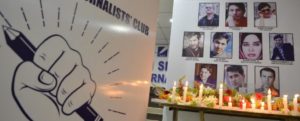 The news broke earlier this month on a Sunday. Viktoria Marinova, an investigative journalist, had been killed in Ruse, Bulgaria, a city in the northeast corner of this country. The Danube, on its epic flow, runs through Ruse. Bulgaria is on the river’s southern bank; Romania is to the north. Marinova’s death had been brutal, and the hypotheses swirled. She was 30 years old.
The news broke earlier this month on a Sunday. Viktoria Marinova, an investigative journalist, had been killed in Ruse, Bulgaria, a city in the northeast corner of this country. The Danube, on its epic flow, runs through Ruse. Bulgaria is on the river’s southern bank; Romania is to the north. Marinova’s death had been brutal, and the hypotheses swirled. She was 30 years old.
Two days later I walked into a classroom at the American University in Bulgaria (AUBG) where I teach journalism. Around the conference table—23 students. AUBG is an international university with 1,000 students; about half are Bulgarians. That day my students seemed wary, saturated. Marinova’s death had been dissected and discussed in almost every class. It fogged our heads.
As class began, I brought up her death. After a few desultory comments, we descended into shared silence. Then one of them asked in a voice that carried inside it both child and adult: “Professor Kelly, what can you say to us who sit here, the young ones who think of becoming journalists? What can you say to us now?”
I had nothing.
Bulgaria is about the size of Virginia. It joined the EU 11 years ago with high hopes for its evolution toward reforming and building the institutions that buffet democracies: a robust and respected judiciary with corruption in a minor key, an activated citizenry, watchdog media as monitors of power. Bulgaria is ranked 111th out of 180 countries in the World Press Freedom Index, an annual gauge of media freedom that uses the metrics of media ownership, transparency, pluralism, the legal framework. It has the lowest press freedom ranking of any country in the EU. (The United States is ranked 45 for 2018, falling two positions from last year.)
But this isn’t a civics lesson about Bulgaria. This is a lament for journalists who are killed doing what they do. This lament coats the world, as oblivious to borders as the air or the sun. They are all fallen comrades. This is a lament for the craft, the profession that so enthralled me when I sat in a university classroom 40 years ago, flammable with zeal and purpose and all that journalism appeared to be asking of me. I saw journalism as noble because of its social utility. I was smitten with language and its power, the possibility of membership in the vanguard, and my role as detached observer and chronicler. I never entertained the idea that it might take my life.
In June, four journalists and a staffer were shot at a Maryland community newspaper. Jan Kuciak, a 27-year-old investigative reporter in Slovakia, shot in his home. Six Mexican journalists killed this year in a country ranked as one of the bloodiest for journalists. Washington Post columnist Jamal Khashoggi. Disappeared. And all of the dozens of others. According to the Committee to Protect Journalists, the death toll this year is 44.
Our national leader has called the media the enemy of the people. And what is it that we do with enemies? “I have a running war with the media. They are among the most dishonest human beings on earth, right?” President Trump asked in his very early days after assuming the presidency. He laces his presidency with fallacious ad hominem arguments against the press, lauds a politician who body slammed a journalist, unleashes anti-media bloodthirst in his rallies and cuddles with the scandalmongering sycophants at Fox News.
According to Reporters Without Borders, “The violent anti-press rhetoric from the highest level of the U.S. government has been coupled with an increase in the number of press freedom violations at the local level as journalists run the risk of arrest for covering protests or simply attempting to ask public officials questions.” Mistrust of the media is not breaking news.
What it feels like instead is a toxic agent leaking into our national water system.
While despair stymied me a few weeks ago as I sat with my students in the classroom, I’ve thawed and turned again to action in front of my students. I am the past; they are the future, and I see part of my role as a teacher is reminding them of possibility and encouraging their best selves forward.
To my students I say: There is a future before you, wide, unknown, full of mystery and maybe. While the past has its miseries and missteps, use them as stepping stones. Rather than writing the same old story, harness what you can. Rewrite. You need not submit to this world as it is. Lament the losses. Mourn the dead. Then ignite and light your way into the world you are already helping to create.
Originally a flatlander, Laura Kelly is a journalism professor who teaches writing and storytelling at the American University in Bulgaria. She lives in Flagstaff during the summer months and calls the city one of her homes. She uses Mary Oliver’s words as her manifesto: “Pay attention. Be astonished. Tell about it.”

